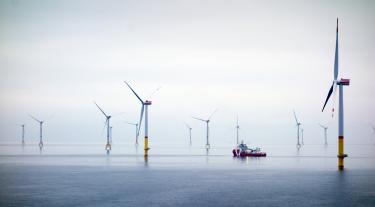Publication date: October 2008
Information in this report was correct at the time of publication
Publication date: October 2008
The Offshore wind power study (PDF) study assesses the challenges to deploy UK offshore wind power to meet renewable energy and carbon emission targets and how to maximise the environmental, economic and security benefits.
In March 2007, the European Union set a target that 20% of energy consumed across Europe would need to come from renewable sources by 2020. Different countries took on different targets, based on both their existing renewable capacity and relative GDP per capita. The UK needs to deliver a target of 15%. This needs to be achieved across the three energy consumption categories: transport, heat and electricity. Depending on the extent to which transport and heat deliver, this could require 40% of consumed electricity to come from renewables by 2020 - a tenfold increase in just over ten years.
Offshore wind potential
In the 2006 report CTC610 - Policy frameworks for renewables, the Carbon Trust concluded that offshore wind power has the greatest potential to deliver renewable electricity power by 2020 in the UK. Now with the step change implied by the EU target, this study builds on the Carbon Trust's knowledge and experience in offshore wind to assess:
- How much offshore wind power capacity could reasonably be required to reach the 2020 renewable energy target?
- What would be required to deliver this, cost effectively and to the maximum benefit of the UK?
- What should the UK Government, industry and other stakeholders do to achieve the above?
The extent of industry transformation and the long timescales demand a strategic perspective. The Carbon Trust worked together with the strategy consultancy The Boston Consulting Group (BCG) and commissioned new analyses from technical consultancies.
The study draws these together with interviews with leading industry and government stakeholders into a cohesive set of insights and recommendations. The study demonstrates that the UK will need to build 29GW of offshore wind by 2020. Whilst this represents a challenge similar in scale to developing North Sea oil and gas, it is technically feasible. Given the amount of investment and public support required, Government has a major role making it possible, minimising costs to the consumer and maximising the UK economic benefit. This study has been developed with strong collaboration from both Government and industry. It is hoped that they will now take up these recommendations with the priority and urgency they require.
Download the report:


